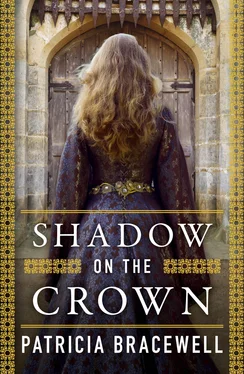Harper
An imprint of HarperCollins Publishers
1 London Bridge Street
London SE1 9GF
www.harpercollins.co.uk
First published by HarperCollins Publishers 2013
Copyright © Patricia Bracewell 2013
Map © Matt Brown 2013
Cover layout design © HarperCollins Publishers Ltd 2014
Cover photography © Richard Jenkins
Patricia Bracewell asserts the moral right to be identified as the author of this work.
A catalogue record for this book is available from the British Library.
This novel is entirely a work of fiction. The names, characters and incidents portrayed in it, while at times based on historical figures, are the work of the author’s imagination.
All rights reserved under International and Pan-American Copyright Conventions. By payment of the required fees, you have been granted the non-exclusive, non-transferable right to access and read the text of this e-book on-screen. No part of this text may be reproduced, transmitted, down-loaded, decompiled, reverse engineered, or stored in or introduced into any information storage and retrieval system, in any form or by any means, whether electronic or mechanical, now known or hereinafter invented, without the express written permission of HarperCollins.
Source ISBN: 9780007481767
Ebook Edition © 2014 ISBN: 9780007481750
Version: 2015-09-29
For Lloyd, Andrew, and Alan
The English Court, 1001–1005
Æthelred II, Anglo-Saxon king of England
Children of the English king, in birth order:
Athelstan
Ecbert
Edmund
Edrid
Edwig
Edward
Edgar
Edyth
Ælfgifu (Ælfa)
Wulfhilde (Wulfa)
Mathilda
Leading Nobles and Ecclesiastics
Ælfhelm, ealdorman of Northumbria
Ufegeat, his son
Wulfheah, his son (Wulf)
Elgiva, his daughter
Ælfric, ealdorman of Hampshire
Ælfgar, his son
Hilde, his granddaughter
Ælfheah, bishop of Winchester
Godwine, ealdorman of Lindsey
Leofwine, ealdorman of Western Mercia
Wulfstan, archbishop of Jorvik and bishop of Worcester
The Norman Court, 1001–1005
Richard II, duke of Normandy
Robert, archbishop of Rouen, brother of the duke
Judith, duchess of Normandy
Gunnora, dowager duchess of Normandy
Mathilde, sister of the duke
Emma, sister of the duke
Swein Forkbeard, king of Denmark
Harald, his son
Cnut, his son
A.D. 978In this year was King Edward slain at even-tide, at Corfe-gate, on the fifteenth before the kalends of April, and he was buried at Werham without any royal honours. Nor was a worse deed than this done since men came to Britain … Æthelred was consecrated king. In this same year a bloody sky was often seen, most clearly at midnight, like fire in the form of misty beams. As dawn approached, it glided away.
– The Anglo-Saxon Chronicle
Table of Contents
Cover
Title Page
Copyright
Dedication
Epigraph
Map
Prologue
Chapter One
Chapter Two
Chapter Three
Chapter Four
Chapter Five
Chapter Six
Chapter Seven
Chapter Eight
Chapter Nine
Chapter Ten
Chapter Eleven
Chapter Twelve
Chapter Thirteen
Chapter Fourteen
Chapter Fifteen
Chapter Sixteen
Chapter Seventeen
Chapter Eighteen
Chapter Nineteen
Chapter Twenty
Chapter Twenty-one
Chapter Twenty-two
Chapter Twenty-three
Chapter Twenty-four
Chapter Twenty-five
Chapter Twenty-six
Chapter Twenty-seven
Chapter Twenty-eight
Chapter Twenty-nine
Chapter Thirty
Chapter Thirty-one
Chapter Thirty-two
Chapter Thirty-three
Chapter Thirty-four
Chapter Thirty-five
Chapter Thirty-six
Chapter Thirty-seven
Chapter Thirty-eight
Chapter Thirty-nine
Chapter Forty
Chapter Forty-one
Chapter Forty-two
Author’s Note
Glossary
Acknowledgements
About the Author
About the Publisher
Eve of St Hilda’s Feast, November 1001
Near Saltford, Oxfordshire
She made a circuit of the clearing among the oaks, three times round and three times back, whispering spells of protection. There had been a portent in the night: a curtain of red light had shimmered and danced across the midnight sky like scarlet silk flung against the stars. Once, in the year before her birth, such a light had marked a royal death. Now it surely marked another, and although her magic could not banish death, she wove the spells to ward disaster from the realm.
When her task was done she fed the fire that burned in the centre of the ancient stone ring, and sitting down beside it, she waited for the one who came in search of prophecy. Before the sun had moved a finger’s width across the sky, the figure of a woman, cloaked and veiled, stood atop the rise, her hand upon the sentinel stone. Slowly she followed the path down through the trees and into the giants’ dance until she, too, took her place beside the fire, with silver in her palm.
‘I would know my lady’s fate,’ she said.
The silver went from hand to hand, and against her will, the seer glimpsed a heart, broken and barren, that loved with a dark and twisted love. But the silver had been given, and at her nod, a lock of hair was laid upon the flames. She searched for visions in the fire, and they tumbled and roiled until they hurt her eyes and scored her heart.
‘Your lady will be bound to a mighty lord,’ she said at last, ‘and her children will be kings.’
But because of the darkness in that heart across the fire, she said nothing of the other, of the Lady who would journey from afar, and of the two life threads so knotted and tangled that they could not be pulled asunder for a lifetime or for ever. She did not speak of the green land that would burn to ash in the days to come, nor of the innocents who would die, all for the price of a throne.
There would be portents in the sky again tonight, she knew, and high above her the stars would weep blood.
A.D. 1001This year there was great commotion in England in consequence of an invasion by the Danes, who spread terror and devastation wheresoever they went, plundering and burning and desolating the country … They brought much booty with them to their ships, and thence they went into the Isle of Wight and nothing withstood them; nor any fleet by sea durst meet them; nor land force either. Then was it in every wise a heavy time, because they never ceased from their evil doings.
– The Anglo-Saxon Chronicle
24th December 1001
Fécamp, Normandy
The winter of 1001 in northwestern Europe would have been recorded as the coldest and fiercest in seventy-five years, had anyone been keeping such records. In late December of that year, a storm tore out of the arctic north with terrible speed, blasting all of Europe but striking hardest at the two realms that faced each other across the Narrow Sea.
In Normandy, it began with a sudden drop in temperature and a freezing rain that coated the limbs of the precious fruit trees in the Seine’s fertile valley. A driving wind swept behind the rain, snapping brittle, frozen branches and scattering the promise of next summer’s harvest over wide, sleet-covered fields. For a full day and night the storm raged, and when the worst of it was spent, a light snow fell upon the wasted landscape as quietly as a benediction.
Читать дальше












